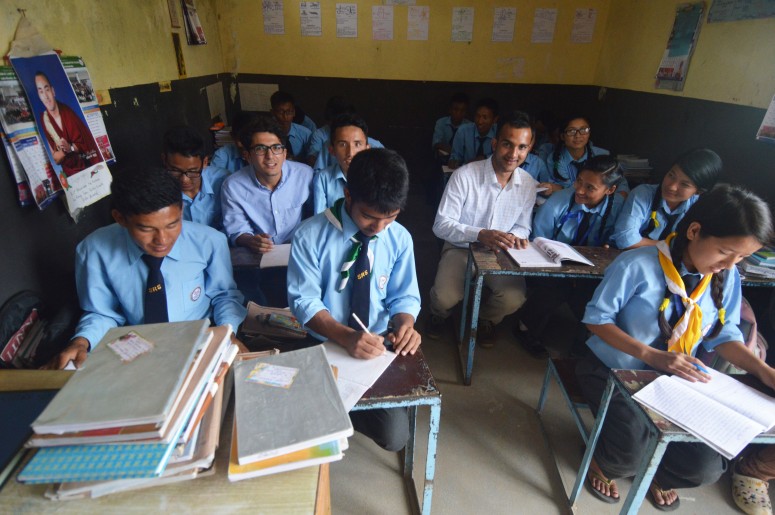Reinstalling Hope

From Kenyon News - June 26, 2014
Outside the main blue-and-white building of the Shree Baghbhairab Higher Secondary School on the outskirts of Kathmandu, Nepal, there is a dirt courtyard used as a soccer field.
After a week of tutoring students, Manjul Bhusal Sharma ’16 and Maher Latif ’17 were holding a soccer training session there recently when one of the students addressed Latif with “dai,” the Nepali word for “brother.”
“The first day you told us you are not our teachers, but our friends,” Bhusal Sharma recalled him saying. “You are neither my teachers nor my friends. You are my brothers.”
Bhusal of Kathmandu and Latif of Upper Arlington, Ohio, are immersed this summer in carrying out “Reinstalling Hope,” a project the pair started to enrich learning opportunities at two public schools, Shree Baghbhairab and Snowland Ranag Light of Education School. In April, they created a page at Gofundme.com, a fundraising website, and brought in more than $3,000 to buy school materials and set up 10 scholarships at each school.
“Since I grew up in Nepal, and I finished my high school here, I’ve always been concerned about the disparity students in Nepal face,” Bhusal Sharma said. “I went to a private school in the city, but I had friends who went to that school and, like, everything between us was the same, but when it came to educational opportunities, the students of that school” did not have those same opportunities. In fact, Bhusal Sharma visited his former school with Latif and collected more than 1,500 used books — from a single grade — to help build a new library at the public school.
Bhusal Sharma, a double major in economics and math, and Latif, a double major in economics and modern languages and literatures, flew to Nepal on May 28. They have been tutoring upper-level students in English and logging their journey daily on the Reinstalling Hope Facebook page.
“It’s been an experience,” said Latif, who had never been to Nepal before. They were surprised by how little English the students knew.
One of the biggest challenges has come not from the students, however, but the teachers. “With government teachers, they don’t have any motivation,” Latif said. “They don’t really care about the students’ progression.”
While Bhusal Sharma said the teachers are supportive more in words than in deeds, the two are managing to circumvent the bureaucracy, working directly with students to improve their English and form the kind of bonds made outside the classroom — like those on the soccer field.
“That was really rewarding to us,” Bhusal Sharma said, “to actually form connections and reach their hearts as well as their minds.”
Latif and Bhusal Sharma hope to continue the project in some fashion after the summer, and plan on having an area volunteer monitor the progress of the students, whom they will stay in touch with via social media.
By Henri Gendreau ’16